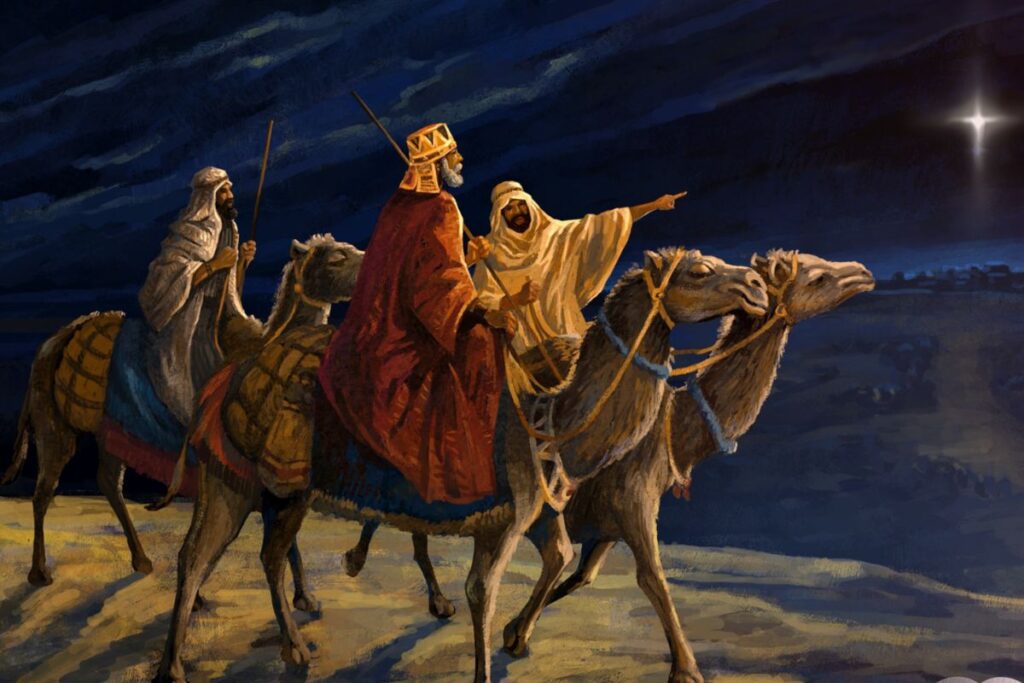
“The wise men visit Jerusalem to pay homage to the ‘king of the Jews,’ marking a momentous occasion (Matthew 2:1-12). A careful examination of the text in question unveils a persuasive storyline.
Initially, the wise men seek an audience with King Herod, the head of state in Jerusalem. However, instead of aligning themselves with the powerful King Herod, they deliberately opt to follow the guidance of God. Their decision serves as a demonstration of their commitment to defending those who are vulnerable.
The Disruption of the Balance of Power.
The account of the Magi’s visit to Jesus begins with their dialogue with King Herod concerning the birth of the king of the Jews. They are directed by a celestial phenomenon—a guiding star.
The Magi begin their journey to Jerusalem in an effort to locate the newborn and pay homage to him. As the narrative unfolds, it becomes apparent that the revelation of the birth of the king of the Jews alarms not only Herod but all of Jerusalem.
The birth of the ‘King of the Jews’ unsettles the prevailing power dynamics, particularly Herod’s questionable agreement with the Romans. Herod, upon learning of the birth of the king of the Jews, convenes a meeting with the chief priests and teachers of the law. He ascertains that the Messiah is prophesied to be born in ‘Bethlehem in Judea.’
Herod directs the wise men to return to him with information about the King of the Jews. His stated intention, ‘…I, too, may go and worship him’ (v. 8), is ironic. Herod keeps his sinister intentions towards the newborn Messiah hidden. In stark contrast, the wise men pursue the Messiah with enthusiasm, recognizing him as the king of the Jews.
The Refusal to Collaborate with Evil
The wise men arrive at the birthplace of the Messiah, guided by the celestial star that leads them there. They find ‘the child with his mother Mary, and they bow down and worship him’ (v. 10).
The wise men recognize Jesus as the Messiah and seize the opportunity to present Him with the finest gifts. They offer gold, frankincense, and myrrh, joyfully fulfilling their quest with not just gifts, but also their worship.
One can assume that locating the birth of the promised Messiah brings enormous joy despite finding the newborn Messiah in a humble manger rather than in the splendour of a Palace.
Following their encounter with the Messiah and heeding warnings from their dreams, the wise men choose a different path for their return journey. They refuse to collaborate with the powerful King Herod. One could easily assume that their decision is made to protect the baby Messiah. Similarly, Joseph is given a divine warning about Herod’s wicked plans and is told to take the family to Egypt for safety.
Herod’s Heinous Act
His true motivations become clear in the latter part of the Gospel. When Herod learns of the wise men’s divergent plan, he becomes enraged. He issues a ruthless order to eliminate all male infants under the age of two (v. 16).
A reasonable assumption is that Herod sees the birth of the Messiah as a direct threat to both his political standing and the stability of the empire. This perception fuels his deception, highlighting the tenuous relationship between Herod and the empire.
The True Essence of ‘Wise Men’
In describing these wise men, the word ‘wise’ goes beyond their recognition of divine signs and their ability to locate the Messiah’s birthplace. They are wise because they are able to discern whom to listen to in a world filled with powerful figures and competing interests.
During their search for the Messiah, the wise men have to make a critical decision. Instead of accepting Herod’s offer of prestige, security, and financial rewards for information about the infant Messiah, they choose to pursue a higher calling. Their wisdom is evident in their refusal to conspire with King Herod.
In finding the Messiah, the wise men discover their true calling when they come across the helpless newborn. God guides them to follow the divine path that transcends the temptations of wealth and power. In addition to recognizing divine signs, they prioritise trusting in God after meeting .
Wise up – A key Christmas Takeaway!
In the face of formidable earthly power and influence, the Magi’s decision is a powerful lesson in discernment.The narrative conveys a valuable lesson in a society where power and position are alluring.
It is commendable that the wise men do not jeopardise the divine mission. Moreover, the passage encourages us to put God’s guidance first and to identify with the struggles of the vulnerable, rather than bowing to the powerful. This story serves as a poignant reminder of following God’s guidance.







